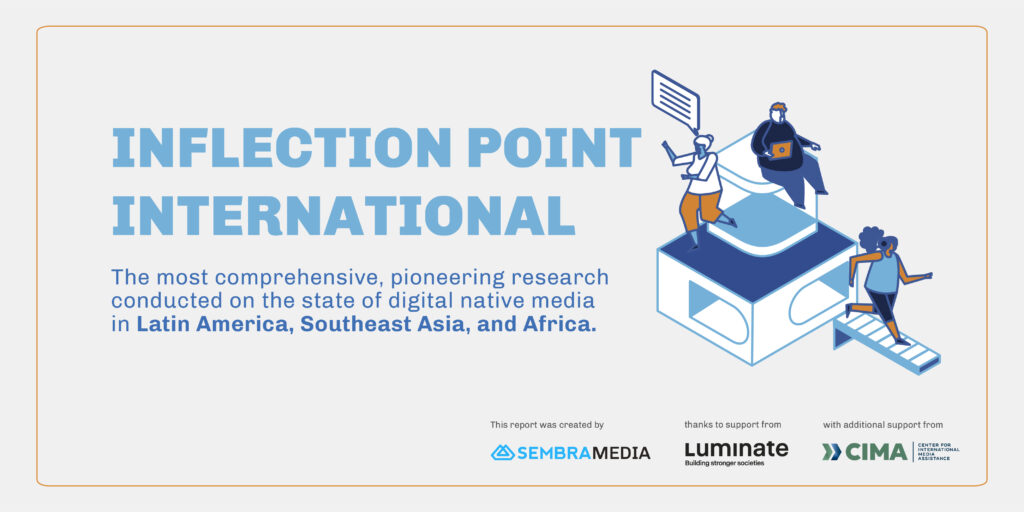In spite of often tiny budgets and constant online threats and attacks, a new global report has revealed that Digital media entrepreneurs are producing ground-breaking journalism and achieving a significant impact on their societies,
The Inflection Point International report, published Thursday, November 4, 2021 by SembraMedia, a nonprofit that supports entrepreneurial journalists, in partnership with the global philanthropic organisation Luminate, is based on interviews with 201 independent digital native media organizations across Latin America, Africa and Southeast Asia.
Coming a month after the announcement of journalists Maria Ressa and Dmitry Muratov as 2021 Nobel Peace Prize laureates, the report according to a statement by SambraMedia, found that more than 85 per cent of the media outlets interviewed had produced journalism that had led to significant political and societal changes.
“This report shines a light on a new generation of creative and courageous media entrepreneurs, who, like Nobel Laureates Maria Ressa and Dmitry Muratov, are having a real impact on their societies, strengthening the workings of democracy and holding power to account,” said Stephen King, CEO of Luminate.
The top three ways media outlets reported having achieved impact were:
- Contributed to increased civil engagement (76%)
- Inspired audience members to participate in protest demonstrations in person or through online activism (42%)
- Contributed to a change in laws or the legal system (38%)
Janine Warner, co-founder of SembraMedia said the 2021 findings built on those of the first Inflection Point report, which focused only on Latin America and was released in 2017.
“While there are differences across the three regions, what struck us most as we reviewed the data were the similarities that emerged among these news organizations as they strive to cover their communities and build sustainable business models,” she said. “Our goal with this report is to draw lessons from the innovative media organizations we studied so others can learn how to build stronger and more sustainable organizations without compromising their journalistic ethics.”
Some of the outlets studied were established news sites, such as Chequeado in Latin America, the Daily Maverick in South Africa and Malaysiakini in Southeast Asia, but many were much smaller. While 60 per cent of the digital news outlets interviewed made less than US$50,000 in revenue, they suffered less from the ‘pandemic crash’ than traditional media as they were less reliant on advertising revenue.
Grant funding, notably from international philanthropic organizations and corporations, was their largest source of income, growing from 16 per cent in the 2017 study to 28 per cent in 2019, and 31 per cent in 2020. It was highest in Latin America. Beyond grants and advertising, media organizations also earned income from consultancy services, content production and reader revenue.
Stephen King of Luminate said: “This report demonstrates the vital role that grant funding is playing in supporting digital media organizations through this pivotal moment of change.
This is not about funding without end – it’s about helping a vibrant new generation of media entrepreneurs to evolve their business models so they can build pathways to sustainability while continuing to produce important journalism in the public interest.”
The report urges outlets to employ a staff member dedicated to driving revenue, finding outlets with a paid salesperson on staff earned six to nine times more revenue in 2019.
Similarly, media with a dedicated tech or innovation lead reported three times higher revenue.
Another striking finding was that 32 per cent of the founders of the companies studied were women – compared with newspapers and television stations in their markets where ownership is as low as one per cent.
A quarter of outlets said that at least one of their founders represented a minority community in their country. Many of the outlets interviewed report on and/or for underserved communities, from Amazônia Real that covers issues affecting people in the Amazon, to
BaleBengong.id in Indonesia which covers LGBTQ+, people with mental health issues, and audiences with HIV/AIDs.
In spite of their impact, the report found many digital-native outlets still operate under an unthinkable barrage of threats and attacks, especially those reporting on hot-button issues such as human rights, corruption and abortion. Across all three regions, 51 per cent of the media organizations in this study said they were the victim of digital attacks, and 40 per cent said they had been threatened for their work – often weekly if not daily.
When it comes to coverage, investigative reporting was most common in Latin America, breaking news in Africa and opinion journalism in Southeast Asia. Solutions journalism was favoured in Africa with almost half of newsrooms saying they engaged in it.
The full report is available on the Inflection Point International website and can be downloaded in English, Spanish, and Portuguese. The Executive Summary is available in 12 other languages, including French, Thai, and Filipino.


